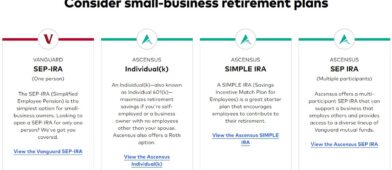A 401(k) is one of the best ways you can save for your retirement.
You can contribute to them and deduct your contributions, thus deferring taxes. You watch them grow tax-free, regardless of what you do with your investments. And you only pay taxes when you take disbursements in retirement.
Add to that a potential company match, which is free money, and it’s a perfect retirement vehicle. It’s so valuable that the Secure Act 2.0 made it so that you have to opt out of a 401(k) rather than opt in. 401(k) plans will not be automatic enrollment (starting in 2025).
A 401(k) plan is great but not all 401(k) plans are great.
What if your employer offers a bad 401(k)?
Should you still invest?
How can you tell if the plan is good or bad?
Table of Contents
No Employer Match
I’ve had two corporate jobs and each of them had a company match (typically worked out to be up to 3% of my annual salary) but this isn’t universal. Many companies offer a 401(k) without an employer match.
While this alone is not a good enough reason to forgo 401(k) contributions, it is an important factor to note.
Take note of the vesting schedule of the match too. Sometimes a company will require you the remain at the company for a number of years before you get to “keep” the match. If you quit, you can still rollover your 401(k) but you won’t get the match.
But if your company doesn’t offer an employer match, it is one strike against the 401(k).
High Fees (Over 1.00%)
There are three fees to consider in your 401(k):
- Plan administrative fees – fees the plan administrator charges each year to manage the 401(k).
- Investment fees – expense ratios and loads charged by the underlying funds.
- Service fees – every other fee within the 401(k) like when you take out a loan, rollover, etc.
The first two (plan administrative and investment fees) should be around 1% of your balance. If it’s over, you’re paying more than average. If it’s less, you’re paying less (great!).
While your fund fees will always be a percentage, your plan administrative fees are typically a flat fee. They may charge you $50 a year in plan fees, regardless of your balance. Be sure to calculate these accurately when thinking about your costs.
💡As a point of comparison, my Solo 401(k) is held at Vanguard and there is no fee for the account itself. There is a $20/year fee for each fund held in the account but that is waived because our balance is high enough (over $50,000). The underlying funds are all Vanguard index funds (VBTLX, VFIAX, VWIGX) with expense ratios of 0.05%, 0.04%, and 0.45% respectively.
If your annual fees are over 1.00%, which is more likely if your plan does not offer any index funds, then this is a good reason to reconsider a 401(k).
High fees? Strike two.
Bad Investment Options
“Bad” investment options usually come down to two reasons – poor performance or they’re too expensive (thus dragging down returns).
Actively managed funds rarely beat index funds.
If your fund is chock full of actively managed and expensive mutual funds, it’s not a great plan.
If it has a mix of actively managed and index funds, then you have both good and bad options and you can simply pick from the good ones!
If the options are all bad, that’s yet another strike.
No Match + High Fees = Reconsider
If you have to pay 2% in fees but you’re getting an employer match, you have to do the math to see if the “free money” overcomes the high fees. Usually it does, unless you have some crazy fees or you aren’t going to be able to contribute a lot.
For example, if your employer offers a match of up to 3% of your salary of $50,000 – that’s $1,500 each year. That far outweighs 2% in fees.
This is when you need to review the vesting schedule of the match because it can make a huge difference. My employers never had a vesting schedule, you got your match immediately. Some companies require you to remain for a year or two (or more!), or you surrender a pro rated portion of your match once you leave.
If there is no match, high fees, and bad options – that’s three strikes and you should consider alternatives.
💡My friend and reader Gerry read this post and suggested an exception… if you think you’ll only be at a job for a few years, it might make sense to contribute into a bad 401(k) just to get the money in there. Even if it’s not a great plan, you can roll it over into a better plan when you quit.
Alternatives to a 401(k)
A good 401(k) is a great investment option but there are alternatives because many companies, especially smaller ones, do not offer a 401(k). Some offers terrible ones.
Traditional & Roth IRAs
These are the most well known and best alternatives to a 401(k).
A Traditional IRA is like a “small” 401(k) because it’s a tax-deferred investment account.
A Roth IRA is a completely different animal that deserves separate treatment (you contribute after-tax dollars) but the two share an annual contribution cap ($7,000 in 2024).
For IRAs, you can open them with any broker that offers IRAs. I recommend going with one that is low cost since they will all give you access to similar products.
Health Savings Account
A health savings account is not a retirement account per se but it shares a lot of similarities with a retirement account in that you contributions are tax deductible and your earnings are tax-deferred. You can get an HSA if you have a high-deductible health plan, which may or may not apply to you.
Taxable Brokerage Account
This is just a regular ole brokerage account with no special tax benefits. This should be the last thing you consider for retirement if you have a bad 401(k) because it has no special tax benefits!
Conclusion
A 401(k) is a fantastic retirement vehicle when you have a good company match, good investment options, and relatively low fees.
If you don’t have a great plan, it still may be worth contributing if you get a decent match.
Ultimately, these all depend on other factors as well. If you don’t intend to contribute a lot to your 401(k), because you have other higher priority savings goals, you may wish to hold off.
In the end, your specific situation will dictate whether your 401(k) is good or bad right now. (unless it’s absolutely terrible, then it’s terrible for everyone… except maybe the plan administrator and mutual fund managers!)



